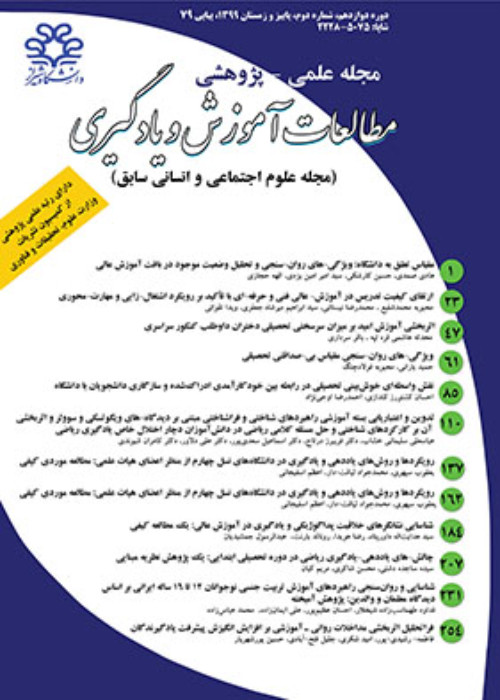Comparing the Effectiveness of Emotional Competence and Problem-Solving Training on Perceived Self-Efficacy among Farhangian University Students
Author(s):
Article Type:
Research/Original Article (دارای رتبه معتبر)
Abstract:
Introduction
Emotional competence refers to ability and skill to negotiate through interpersonal communication and regulate emotional experiences in order to achieve favorable results during emotional conditions (Sharma, 2012). Problem solving training concentrates on obtaining general data about a specified problem, configurating a suitable strategy to solve it and performing and reviewing perfomance until achieving a goal (Kong, Qin, Zhou, Mou, Gao, 2014). Pajares (2003) thinks that self-efficacy beliefs are the bases of important processes such as motivation, psychological welfare and personal interests. Those who have high self-efficacy can remove barriers by means of improving their selfmanagement skills and perseverance and can withstand against problems (Bandura 2004). Chang and Hu (2017) showed that emotional competence plays a mediating role between communication skills and self-efficacy. Zhu, B., Chen, C., Shi, Z., Liang, H. & Liu, B. (2016) showed a significant relationship between emotional competence and selfefficacy. On the other hand, the amount of self-efficacy and productivity among learners and therefore their academic performance improved through problem solving training (woolfolk 2001).
Research Question
Is there any difference between the impact of emotional competence and problemsolving training on perceived self-efficacy among university students?
Methods
This quasi-experimental study was performed using a pre-test, post-test-follow-up and control group design. Te statistical population constituted all the students in Mazandaran Farhangian University during the academic year of 2017-2018. Participants were selected by means of multi-stage cluster sampling and Doctor Shariati boy campus was chosen as a center for the study design. Students of Farsi Literature served as the control group, those of Primary Education as the experimental group for taking the emotional competence training course and the students of English Literatur served as the experimental group for joining the problem solving training course. Participants in the experimental group of emotional competence, problem solving and conrol group were 24 and 20 and 27 students, respectively. They were all male and were senior students. The study commenced with a pre-test (Sherer and Maddux self-efficacy scale (1982)) of the participants in the three groups l, and it lasted for a month. The emotional competence and problem solving training were performed by the researcher during 10 sessions; each session was 75-90 minutes and was repeated 3 times a week. However, the members of the control group did not received any interventions. Participants in the three groups answered the questions of the self-efficacy scale twice again, once at the end of the interventions, (post-test step), and a second timr one month after performing pre-test (followup step).
Results
The average of perceived self-efficacy among the participants in the emotional competence training course changed from 2.86 in the pre-test to 4.28 in the post-test and 4.15 in the followup step. On the other hand, the average of the participants in the problem-solving group changed from 2.84 in pre-test to 4.20 in pre-test and 4.10 in the followup. The mean of the participants in the control group, however, altered from 2.76 in pre-test to 2.91 in post-test and 2.82 in followup step. In order to study the effect of educational methods and to compare the two educational approaches, variance analysis statistical test in frequent measurement was used. The assumptions were analyzed and confirmed before using this test. The results showed a significant difference with 95% confidence level (p<0.05) in the average of perceived self-efficacy and its components (effort, perseverance, initiative) for each of the control, emotional competence training and problem solving training groups during the pre-test, post-test and follow-up steps. Scheffe test showed significant effect of educational course based on emotional competence and also educational course based on problem solving in the pre-test and followup on perceive sel-efficacy and its components at confidence level of 95% (α=0.05). However, no significant difference was observed between the effect of emotional competence training and problem solving training on perceived self-efficacy and its components in the pre-test and followup.
Discussion and Conclusion
The results of this study showed the effectiveness of both methods of emotional cempetence and problem solving training in improving the students’ perceived selfefficacy. However, there was no significant difference between the effect of emotional competence and problem-solving training on the students’ perceived self-efficacy. This effectiveness ustained all through the experiment (1month). The results of the present study are in line with those of Chang and Hu (2017), Zhou et al. (2016), and Woolfolk (2001). Accordingly, based on the model of emotional competence and problem-solving training, it can be argued that students practice different ways in which necessary methods and chances for thinking are provided for them. Therefore, these methods can motivate them to develop new thoughts or ideas and present them without any fear or embarassement. Therefore, it is recommended to plan for emotional competence skills and problem-solving training in order both to help students cope with problems, crisis, to resolve conflict, and to improve communications between the youth and their instructors. The present research recommends Farhangian University officials pay special attention to improving the students’ self-efficacy in order to use methods of emotional competence and problem-solving training. Moreover, it expands the literature on emotional competence, problem solving and self-efficacy.Language:
Persian
Published:
Studies in Learning & Instruction, Volume:10 Issue: 2, 2019
Pages:
142 to 164
magiran.com/p1951469
دانلود و مطالعه متن این مقاله با یکی از روشهای زیر امکان پذیر است:
اشتراک شخصی
با عضویت و پرداخت آنلاین حق اشتراک یکساله به مبلغ 1,390,000ريال میتوانید 70 عنوان مطلب دانلود کنید!
اشتراک سازمانی
به کتابخانه دانشگاه یا محل کار خود پیشنهاد کنید تا اشتراک سازمانی این پایگاه را برای دسترسی نامحدود همه کاربران به متن مطالب تهیه نمایند!
توجه!
- حق عضویت دریافتی صرف حمایت از نشریات عضو و نگهداری، تکمیل و توسعه مگیران میشود.
- پرداخت حق اشتراک و دانلود مقالات اجازه بازنشر آن در سایر رسانههای چاپی و دیجیتال را به کاربر نمیدهد.
In order to view content subscription is required
Personal subscription
Subscribe magiran.com for 70 € euros via PayPal and download 70 articles during a year.
Organization subscription
Please contact us to subscribe your university or library for unlimited access!



